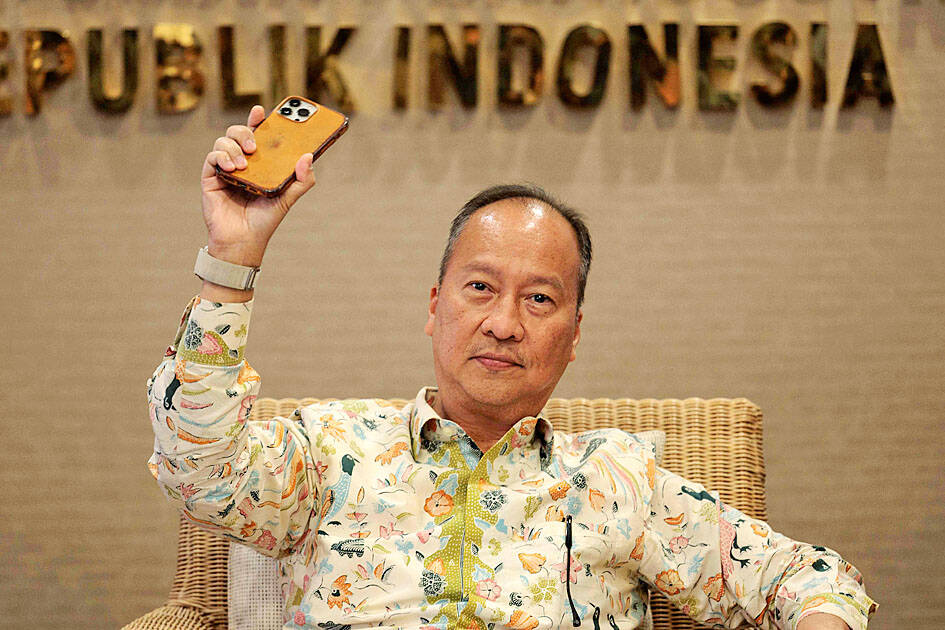Indonesia kept a ban on the sale of Apple Inc’s iPhone 16s, saying its US$1 billion plan that includes building an AirTag factory is insufficient to meet local investment requirements.
Domestic content rules require Apple to produce part of its smartphones or components onshore, while the AirTag is only an accessory, Indonesian Minister of Industry Agus Gumiwang Kartasasmita said in a briefing yesterday.
“As of this afternoon, the government does not have a basis for issuing the local content certificates” that Apple needs to sell its flagship device in Indonesia, he said. “Apple needs to negotiate with us so that we can issue a certificate.”

Photo: AFP
Indonesia blocked iPhone 16 sales in October last year, part of a strategy to persuade the US technology company to invest more in Southeast Asia’s largest economy. Delays in the resumption of sales is depriving Apple revenue from a promising growth market of about 280 million consumers, where it is fighting for foothold with rivals such as Samsung Electronics Co.
Apple could be sanctioned for its continued non-compliance with local investment rules, though that would be the government’s last resort, Kartasasmita said.
“We will look for other ways or options,” he said, adding that the government has already sent a counterproposal to Apple.
An Apple representative in Indonesia declined to comment.
The decision marks an unexpected turn just hours after Indonesian Minister of Investment and Downstream Industry Rosan Roeslani told reporters on Tuesday evening that Indonesia had approved Apple’s plan to put up an AirTag facility. The domestic content requirements are under the purview of the industry minister.
Apple had proposed to build a factory by early next year and commence production of AirTags, a device that allows users to track their luggage, pets or other belongings, according to Roeslani. Company executives are in Jakarta to negotiate with the government on the investment proposal.
Rival phone makers like Samsung and Xiaomi Corp (小米) have set up factories in Indonesia to comply with the domestic content regulations introduced in 2017. Other ways to boost local content include sourcing materials, hiring workers, developing apps and investing in developer academies in the country.
“There’s no deadline for compliance,” Kartasasmita said. “If Apple wants to sell the iPhone 16, and especially if they plan to launch the iPhone 17, the decision is entirely up to them.”

MULTIFACETED: A task force has analyzed possible scenarios and created responses to assist domestic industries in dealing with US tariffs, the economics minister said The Executive Yuan is tomorrow to announce countermeasures to US President Donald Trump’s planned reciprocal tariffs, although the details of the plan would not be made public until Monday next week, Minister of Economic Affairs J.W. Kuo (郭智輝) said yesterday. The Cabinet established an economic and trade task force in November last year to deal with US trade and tariff related issues, Kuo told reporters outside the legislature in Taipei. The task force has been analyzing and evaluating all kinds of scenarios to identify suitable responses and determine how best to assist domestic industries in managing the effects of Trump’s tariffs, he

TIGHT-LIPPED: UMC said it had no merger plans at the moment, after Nikkei Asia reported that the firm and GlobalFoundries were considering restarting merger talks United Microelectronics Corp (UMC, 聯電), the world’s No. 4 contract chipmaker, yesterday launched a new US$5 billion 12-inch chip factory in Singapore as part of its latest effort to diversify its manufacturing footprint amid growing geopolitical risks. The new factory, adjacent to UMC’s existing Singapore fab in the Pasir Res Wafer Fab Park, is scheduled to enter volume production next year, utilizing mature 22-nanometer and 28-nanometer process technologies, UMC said in a statement. The company plans to invest US$5 billion during the first phase of the new fab, which would have an installed capacity of 30,000 12-inch wafers per month, it said. The

Taiwan’s official purchasing managers’ index (PMI) last month rose 0.2 percentage points to 54.2, in a second consecutive month of expansion, thanks to front-loading demand intended to avoid potential US tariff hikes, the Chung-Hua Institution for Economic Research (CIER, 中華經濟研究院) said yesterday. While short-term demand appeared robust, uncertainties rose due to US President Donald Trump’s unpredictable trade policy, CIER president Lien Hsien-ming (連賢明) told a news conference in Taipei. Taiwan’s economy this year would be characterized by high-level fluctuations and the volatility would be wilder than most expect, Lien said Demand for electronics, particularly semiconductors, continues to benefit from US technology giants’ effort

‘SWASTICAR’: Tesla CEO Elon Musk’s close association with Donald Trump has prompted opponents to brand him a ‘Nazi’ and resulted in a dramatic drop in sales Demonstrators descended on Tesla Inc dealerships across the US, and in Europe and Canada on Saturday to protest company chief Elon Musk, who has amassed extraordinary power as a top adviser to US President Donald Trump. Waving signs with messages such as “Musk is stealing our money” and “Reclaim our country,” the protests largely took place peacefully following fiery episodes of vandalism on Tesla vehicles, dealerships and other facilities in recent weeks that US officials have denounced as terrorism. Hundreds rallied on Saturday outside the Tesla dealership in Manhattan. Some blasted Musk, the world’s richest man, while others demanded the shuttering of his